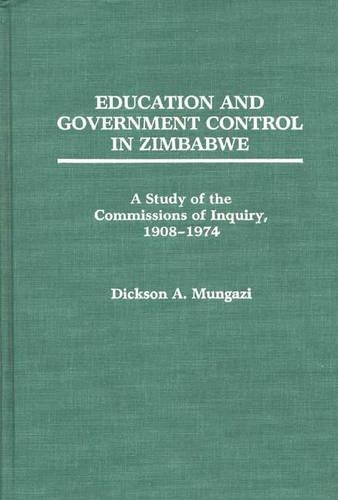
Education and Government Control in Zimbabwe: A Study of the Commissions of Inquiry, 1908-1974
(Hardback)
Publishing Details
Education and Government Control in Zimbabwe: A Study of the Commissions of Inquiry, 1908-1974
By (Author) Dickson Mungazi [Deceased]
Bloomsbury Publishing PLC
Praeger Publishers Inc
19th January 1990
United States
Classifications
Tertiary Education
Non Fiction
National liberation and independence
Social and cultural history
Education / Educational sciences / Pedagogy
379.6891
Physical Properties
Hardback
154
Description
This pioneering study argues that the bitter civil war that thrust Zimbabwe into international headlines from 1966 to 1979 had its roots in the reports issued by the colonial commissions of inquiry into education. As the author explains in his introduction, these commissions and the reports they issued, which reinforced separate educational systems for African and white students, reached far beyond educational policy in their effects. Basing his work on original documents and materials which have not appeared in print before - most of which were only recently declassified by the government of Zimbabwe - the author shows the profound influence these reports had on government policy, on government control of opportunity in general, and on the relationships between and among institutions within the country. Following an introductory overview, Mungazi turns to discussion of the specific issues which the commissions were appointed to investigate. Separate chapters are then devoted to the circumstances surrounding the naming of commissions, their findings and recommendations, and the implications of implementing their recommendations on the character of colonial society itself. This chronological treatment enables the author to focus particularly on how the recommendations of the commissions constituted a sequence of developments that led inevitably to conflict. The final chapter draws some conclusions regarding the social environment that produced a major national conflict and discusses what might be learned from the tragic events that took place in Zimbabwe from 1966 to 1979.
Reviews
A case study of how educational policy was formulated in pre-independence Zimbabwe (formerly Rhodesia), this volume focuses on the several official commissions that made recommendations concerning education during the British colonial period. The basic argument is that the commissions were a means of the British and White minority interests to maintain control over education and to ensure that the content and pedagogy of the schools was consistent with colonial interests. The author argues that education policies were a significant contributing factor to the unrest that eventually resulted in the downfall of the white minority regime and the emergence of an independent Zimbabwe. Although the commission reports that constitute the core of this research are significant, it would have been very useful to consider other elements in the development of educational policy and practice. This book constitutes one part of a complex web of relationships. As such, it does not provide the full picture, but it is a useful contribution to the development of a history of African education. Because of its highly specialized nature, this volume is recommended only for those concerned with African education at the graduate level.-Choice
"A case study of how educational policy was formulated in pre-independence Zimbabwe (formerly Rhodesia), this volume focuses on the several official commissions that made recommendations concerning education during the British colonial period. The basic argument is that the commissions were a means of the British and White minority interests to maintain control over education and to ensure that the content and pedagogy of the schools was consistent with colonial interests. The author argues that education policies were a significant contributing factor to the unrest that eventually resulted in the downfall of the white minority regime and the emergence of an independent Zimbabwe. Although the commission reports that constitute the core of this research are significant, it would have been very useful to consider other elements in the development of educational policy and practice. This book constitutes one part of a complex web of relationships. As such, it does not provide the full picture, but it is a useful contribution to the development of a history of African education. Because of its highly specialized nature, this volume is recommended only for those concerned with African education at the graduate level."-Choice
Author Bio
DICKSON A. MUNGAZI is Associate Professor of Education at Northern Arizona University in Flagstaff.
